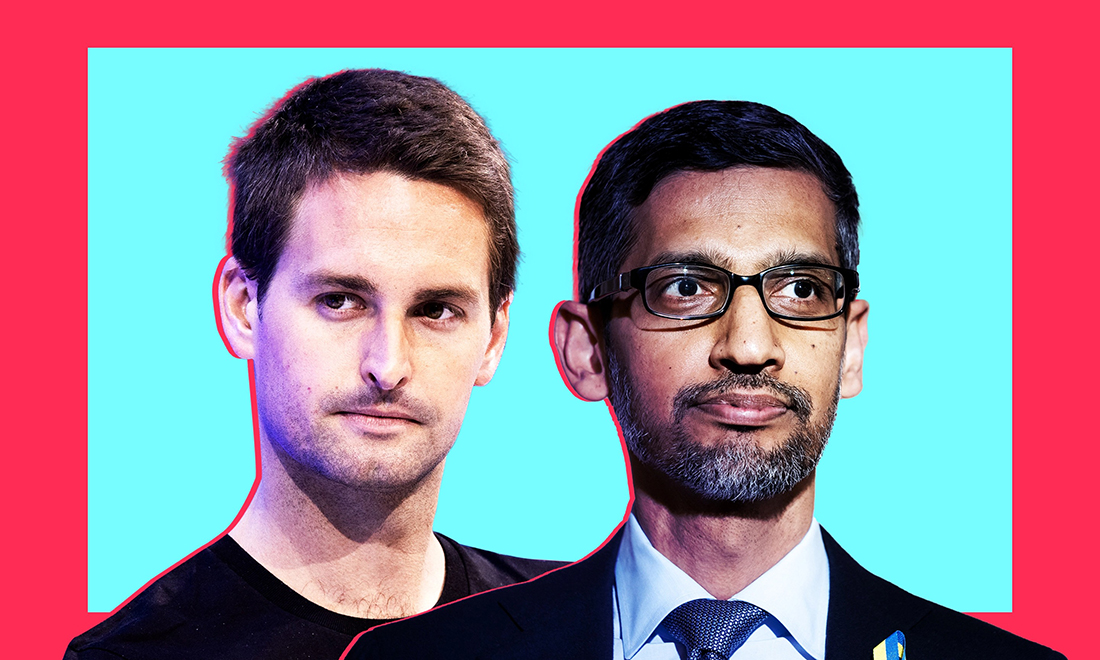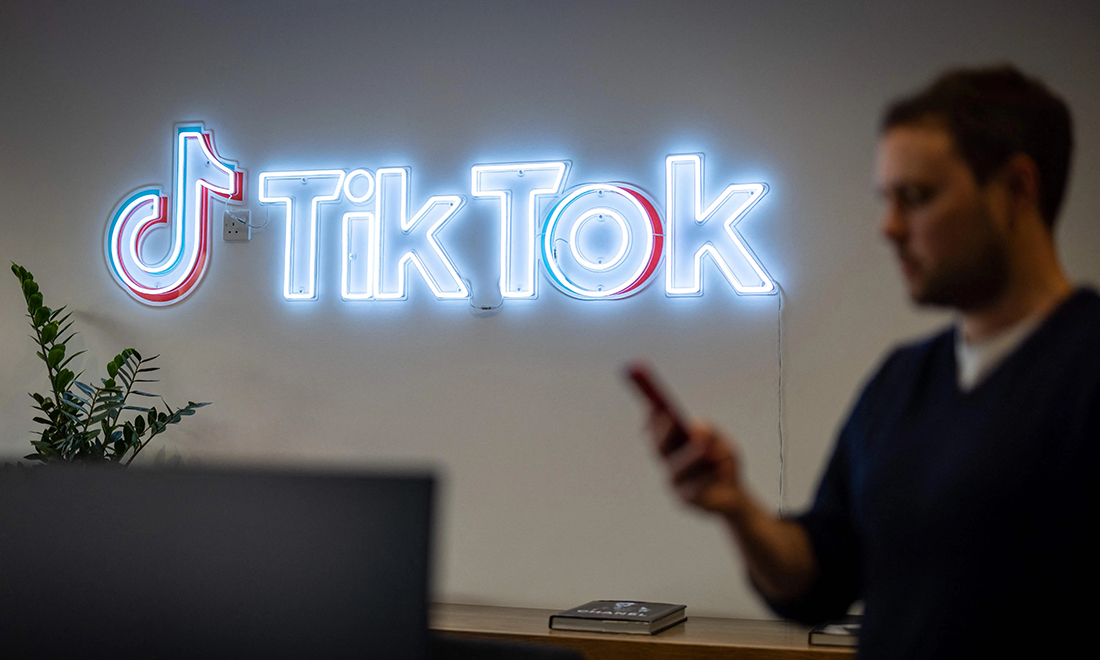
上周,Alphabet的首席执行官桑达尔·皮查伊在洛杉矶举办的一个科技会议上发表讲话时,指出他的公司面临来自“不知从哪里冒出来”的勇敢新进公司带来的威胁。
“三年前,我们都没有人谈论TikTok。”皮查伊在代码大会(Code Conference)上对观众说。他将这款流行的中国社交媒体应用程序称为Alphabet的“新兴”竞争对手之一。
一天后,当Snap的首席执行官埃文·斯皮格尔在同一场会议上提到TikTok时,他似乎在谈论一家完全不同的公司。根据斯皮格尔的说法,TikTok是一个庞然大物,花费“数十亿美元”来抢占市场份额,并从Snapchat等应用程序抢走用户。
这两种看似矛盾的评价凸显了这款视频分享应用程序在多大程度上引发了硅谷大型科技公司的关注和担忧。就TikTok带来的威胁的性质而言,它们可能意见不一,但科技行业的大型公司一致认为,来自海外的新兴竞争对手带来的危机迫在眉睫,与它们以前面临的任何威胁都不同。
TikTok拥有超过10亿用户,在短短几年时间里就跃升为全球顶级互联网社交媒体服务商。TikTok是字节跳动旗下的一款应用程序。字节跳动是一家中国科技公司,这给原本可能被视为竞争格局中的一场标准洗牌增加了地缘政治变数。
在整个硅谷,关于TikTok的话题无处不在。在大型会议和公司会议上,每个人都有自己的观点。
当被问及大型科技公司最近对TikTok的评论时,企业家及天使投资人贾森·卡拉坎尼斯给《财富》杂志发消息称:“我们允许这款软件在美国运行,真是疯了——[这]与竞争无关,而是与影响力和安全有关。”
当然,TikTok在过去也曾经受到审查,最著名的是美国前总统唐纳德·特朗普试图在美国禁止该应用程序。但当联邦法官阻止了这一提议时,这一努力最终以失败告终。在当时的许多观察人士看来,特朗普的反TikTok运动是一种过度反应,既出于个人不满,也出于所谓的安全考虑。
但随着TikTok的势头持续增长,以及中美关系持续紧张,科技行业对这款视频分享应用程序越来越感到不安。为了遏制TikTok的发展,老牌科技公司的应对策略看起来难以预测,从前一天谴责该公司转变为第二天模仿它。
今年3月,《华盛顿邮报》(Washington Post)报道称,Facebook的母公司Meta聘请了一家共和党咨询公司,传播TikTok是中国字节跳动旗下产品的消息,从而引发民众担忧。几个月后,也就是2020年8月,Meta在美国(在Facebook和Instagram上)推出了Reels,这是一款与TikTok几乎相同的短视频产品。谷歌旗下的视频网站YouTube和Snap都发布了自己的TikTok版本,分别名为Shorts和Spotlight。
孩子和广告商都沉迷于TikTok
这些模仿产品似乎都无法复制TikTok的成功。
9月12日,《华尔街日报》(Wall Street Journal)查阅了一份内部研究文件,该文件显示,Instagram用户每天观看Reels的总时长为1,760万小时,还不到TikTok用户每天观看1.978亿小时的十分之一。文件还显示,在Reels上分享的视频中,约有三分之一最初是在另一个应用程序上制作的,通常是TikTok,并带有表明其来源的水印或边框。
企业家及Cost Plus Drugs的联合创始人马克·库班将TikTok的成功归功于其依靠人工智能识别和分享视频的策略,而不是Facebook、推特(Twitter)和Snapchat使用的传统的朋友和熟人“社交图谱”。
“TikTok的敏捷程度非常惊人。内容带他们去哪里,他们就去哪里。”库班告诉《财富》杂志。

库班指出,版权是TikTok的一个潜在弱点。他说,财力雄厚的竞争对手可以锁定音乐、电影和体育的独家版权。
“肯定有多种方法能够击败TikTok。”库班说。“但这不会在一夜之间发生。”
据彭博社(Bloomberg)报道,TikTok在2021年创造了近40亿美元的收入,预计今年将达到120亿美元。这与Facebook和Instagram的母公司Meta在2022年第二季度获得的282亿美元广告收入相比只是九牛一毛,但广告业业内人士表示,TikTok处于有利地位。
战略公司Whisper Advisors的合伙人贾森·拉普对《财富》杂志表示,大型科技公司的担忧是有道理的,无论是迪士尼(Disney)和Netflix,还是Meta和Snap。
“沉迷于TikTok的不仅仅是孩子们,广告商也在关注TikTok。”拉普说。
与此同时,由于美国经济放缓,加之iPhone的制造商苹果(Apple)推出的新隐私功能削弱了定向数字广告的盈利能力,美国顶级消费互联网公司数月来纷纷宣布裁员。Snap在8月下旬裁掉了20%的员工,Meta则开始解雇通过算法随机选出来的员工。这并不是说TikTok完全不受经济低迷的影响。据《连线》杂志(Wired)报道,作为“全公司重组”的一部分,该公司在7月进行了裁员。
随着美国政府对TikTok的打击逼近,那些自身正面临反垄断监管机构更严格审查的老牌互联网公司可能会从中获利,以抵御它们的中国对手。
TikTok坚称,其应用程序与中国母公司字节跳动分开运行,并且没有与中国的运营部门共享美国用户数据。但美国国会议员和一些业内人士并不信服。
但在硅谷对TikTok的痴迷背后,可能是对互联网企业残酷现实的清醒认识。互联网企业是在美国本土发展和完善的。一旦用户转向下一个热门产品,消费者互联网企业很少会出现反弹。包括美国在线(AOL)、雅虎(Yahoo)和MySpace在内的互联网巨头纷纷倒下,这表明,即使是最强大的消费者网络企业,也可能衰落得很快,而且这种衰落过程不可阻挡。
库班在1999年将一家网络公司出售给雅虎,由此发家。他深知互联网企业无情的本质。
库班说:“所有其他大型社交平台都曾经一度看起来不可战胜。如今,它们的受众正在流向TikTok。”(财富中文网)
译者:中慧言-王芳
上周,Alphabet的首席执行官桑达尔·皮查伊在洛杉矶举办的一个科技会议上发表讲话时,指出他的公司面临来自“不知从哪里冒出来”的勇敢新进公司带来的威胁。
“三年前,我们都没有人谈论TikTok。”皮查伊在代码大会(Code Conference)上对观众说。他将这款流行的中国社交媒体应用程序称为Alphabet的“新兴”竞争对手之一。
一天后,当Snap的首席执行官埃文·斯皮格尔在同一场会议上提到TikTok时,他似乎在谈论一家完全不同的公司。根据斯皮格尔的说法,TikTok是一个庞然大物,花费“数十亿美元”来抢占市场份额,并从Snapchat等应用程序抢走用户。
这两种看似矛盾的评价凸显了这款视频分享应用程序在多大程度上引发了硅谷大型科技公司的关注和担忧。就TikTok带来的威胁的性质而言,它们可能意见不一,但科技行业的大型公司一致认为,来自海外的新兴竞争对手带来的危机迫在眉睫,与它们以前面临的任何威胁都不同。
TikTok拥有超过10亿用户,在短短几年时间里就跃升为全球顶级互联网社交媒体服务商。TikTok是字节跳动旗下的一款应用程序。字节跳动是一家中国科技公司,这给原本可能被视为竞争格局中的一场标准洗牌增加了地缘政治变数。
在整个硅谷,关于TikTok的话题无处不在。在大型会议和公司会议上,每个人都有自己的观点。
当被问及大型科技公司最近对TikTok的评论时,企业家及天使投资人贾森·卡拉坎尼斯给《财富》杂志发消息称:“我们允许这款软件在美国运行,真是疯了——[这]与竞争无关,而是与影响力和安全有关。”
当然,TikTok在过去也曾经受到审查,最著名的是美国前总统唐纳德·特朗普试图在美国禁止该应用程序。但当联邦法官阻止了这一提议时,这一努力最终以失败告终。在当时的许多观察人士看来,特朗普的反TikTok运动是一种过度反应,既出于个人不满,也出于所谓的安全考虑。
但随着TikTok的势头持续增长,以及中美关系持续紧张,科技行业对这款视频分享应用程序越来越感到不安。为了遏制TikTok的发展,老牌科技公司的应对策略看起来难以预测,从前一天谴责该公司转变为第二天模仿它。
今年3月,《华盛顿邮报》(Washington Post)报道称,Facebook的母公司Meta聘请了一家共和党咨询公司,传播TikTok是中国字节跳动旗下产品的消息,从而引发民众担忧。几个月后,也就是2020年8月,Meta在美国(在Facebook和Instagram上)推出了Reels,这是一款与TikTok几乎相同的短视频产品。谷歌旗下的视频网站YouTube和Snap都发布了自己的TikTok版本,分别名为Shorts和Spotlight。
孩子和广告商都沉迷于TikTok
这些模仿产品似乎都无法复制TikTok的成功。
9月12日,《华尔街日报》(Wall Street Journal)查阅了一份内部研究文件,该文件显示,Instagram用户每天观看Reels的总时长为1,760万小时,还不到TikTok用户每天观看1.978亿小时的十分之一。文件还显示,在Reels上分享的视频中,约有三分之一最初是在另一个应用程序上制作的,通常是TikTok,并带有表明其来源的水印或边框。
企业家及Cost Plus Drugs的联合创始人马克·库班将TikTok的成功归功于其依靠人工智能识别和分享视频的策略,而不是Facebook、推特(Twitter)和Snapchat使用的传统的朋友和熟人“社交图谱”。
“TikTok的敏捷程度非常惊人。内容带他们去哪里,他们就去哪里。”库班告诉《财富》杂志。
库班指出,版权是TikTok的一个潜在弱点。他说,财力雄厚的竞争对手可以锁定音乐、电影和体育的独家版权。
“肯定有多种方法能够击败TikTok。”库班说。“但这不会在一夜之间发生。”
据彭博社(Bloomberg)报道,TikTok在2021年创造了近40亿美元的收入,预计今年将达到120亿美元。这与Facebook和Instagram的母公司Meta在2022年第二季度获得的282亿美元广告收入相比只是九牛一毛,但广告业业内人士表示,TikTok处于有利地位。
战略公司Whisper Advisors的合伙人贾森·拉普对《财富》杂志表示,大型科技公司的担忧是有道理的,无论是迪士尼(Disney)和Netflix,还是Meta和Snap。
“沉迷于TikTok的不仅仅是孩子们,广告商也在关注TikTok。”拉普说。
与此同时,由于美国经济放缓,加之iPhone的制造商苹果(Apple)推出的新隐私功能削弱了定向数字广告的盈利能力,美国顶级消费互联网公司数月来纷纷宣布裁员。Snap在8月下旬裁掉了20%的员工,Meta则开始解雇通过算法随机选出来的员工。这并不是说TikTok完全不受经济低迷的影响。据《连线》杂志(Wired)报道,作为“全公司重组”的一部分,该公司在7月进行了裁员。
随着美国政府对TikTok的打击逼近,那些自身正面临反垄断监管机构更严格审查的老牌互联网公司可能会从中获利,以抵御它们的中国对手。
TikTok坚称,其应用程序与中国母公司字节跳动分开运行,并且没有与中国的运营部门共享美国用户数据。但美国国会议员和一些业内人士并不信服。
但在硅谷对TikTok的痴迷背后,可能是对互联网企业残酷现实的清醒认识。互联网企业是在美国本土发展和完善的。一旦用户转向下一个热门产品,消费者互联网企业很少会出现反弹。包括美国在线(AOL)、雅虎(Yahoo)和MySpace在内的互联网巨头纷纷倒下,这表明,即使是最强大的消费者网络企业,也可能衰落得很快,而且这种衰落过程不可阻挡。
库班在1999年将一家网络公司出售给雅虎,由此发家。他深知互联网企业无情的本质。
库班说:“所有其他大型社交平台都曾经一度看起来不可战胜。如今,它们的受众正在流向TikTok。”(财富中文网)
译者:中慧言-王芳
When Alphabet CEO Sundar Pichai spoke at a tech conference in Los Angeles last week, he pointed to the threat his company faced from a plucky upstart that had come “from nowhere.”
“None of us were talking about TikTok three years ago,” Pichai told the audience at the Code Conference, describing the popular Chinese social media app as one of Alphabet’s “emerging” rivals.
A day later, when Snap CEO Evan Spiegel mentioned TikTok at the same conference, he seemed to be talking about a completely different company. To hear Spiegel tell it, TikTok was a colossus, spending “billions and billions and billions of dollars” to grab market share and steal users from apps like Snapchat.
The two seemingly contradictory assessments underscore the extent to which the Chinese video-sharing app has captured the attention, and the fears, of Silicon Valley’s most powerful players. They may not agree on the specific nature of the TikTok threat, but the tech industry’s dominant companies are united in their belief that their young competitor from overseas is a clear and present danger unlike any they’ve faced before.
With more than 1 billion users, TikTok has risen to the top tier of the world’s internet social media services in just a few short years. Its ownership by ByteDance, a Chinese tech company, has added a geopolitical twist to what might otherwise have played out as a standard shake-up in the competitive landscape.
Throughout Silicon Valley, the subject of TikTok is pervasive; at conferences and in company meetings, everyone has an opinion.
“We are insane to allow it to operate in the USA—[it] has nothing to do with competition, everything to do with influence and security,” the entrepreneur and angel investor Jason Calacanis messaged Fortune when asked about Big Tech’s recent comments about TikTok.
TikTok has drawn scrutiny in the past, of course, most famously when former President Donald Trump sought to have the app banned in the U.S. That effort ultimately failed when a federal judge blocked the proposition. To many observers at the time, Trump’s anti-TikTok crusade was an overreaction driven as much by personal grievance as by purported security concerns.
But as TikTok’s momentum has continued to grow, and as relations between the U.S. and China have remained tense, the tech industry has become increasingly agitated over the video-sharing app. To try to blunt TikTok’s progress, the established tech companies have at times looked erratic, shifting from denouncing the company one day to imitating it the next.
In March, the Washington Post reported that Facebook parent company Meta had hired a Republican consulting firm to spread stories raising concerns about TikTok’s Chinese ownership. A few months later, in August 2020, Meta launched Reels in the U.S. (on Facebook and Instagram), a short-form video product virtually identical to TikTok. YouTube, the video website owned by Google, and Snap have each released their own TikTok equivalents, called Shorts and Spotlight, respectively.
Kids and advertisers alike are addicted to TikTok
None of those copycat features appear to have replicated the success of TikTok.
On September 12, the Wall Street Journal reviewed an internal research document that showed Instagram users watch Reels for a total of 17.6 million hours each day, which is less than one-tenth of the 197.8 million hours TikTok users apparently watch daily. The document also showed that about one-third of the videos shared on Reels were originally produced on another app, typically TikTok, and bear a watermark or border designating their origin.
Mark Cuban, entrepreneur and cofounder of Cost Plus Drugs, credits TikTok’s success to, among other things, its strategy of relying on artificial intelligence to identify and share videos rather than the traditional “social graphs” of friends and acquaintances used by Facebook, Twitter, and Snapchat.
“TikTok is shockingly agile. They go where the content takes them,” Cuban told Fortune.
Cuban points to licensing rights as a potential weak spot for TikTok. A deep-pocketed rival could lock up exclusive rights to music, movies, and sports, he said.
“There are certainly multiple paths to beat TikTok,” Cuban said. “They just won’t happen overnight.”
TikTok generated nearly $4 billion in revenue in 2021 and is projected to hit $12 billion this year, according to Bloomberg. That’s a fraction of the $28.2 billion in ad revenue that Facebook and Instagram parent Meta brought in from advertising in the second quarter of 2022, but advertising industry insiders say TikTok has the wind at its back.
Jason Rapp, a partner at strategy firm Whisper Advisors, told Fortune that Big Tech is right to be worried, whether it’s Disney and Netflix or Meta and Snap.
“It’s not just kids who are addicted to TikTok, and advertisers are paying attention,” Rapp said.
Meanwhile, America’s top consumer internet firms have been announcing layoffs in waves for months as the U.S. economy has slowed and as new privacy features by iPhone maker Apple have crimped the ability to profit from targeted digital advertising. Snap laid off 20% of its workforce in late August, and Meta began layoffs by randomly selecting them with an algorithm. That’s not to say TikTok is completely unaffected by the downturn; the firm conducted its own layoffs in July as a part of “companywide restructuring,” according to Wired.
With the specter of a U.S. government crackdown on TikTok looming, the established internet companies—who themselves are facing heightened scrutiny from antitrust regulators—may get a helping hand to fend off their Chinese foe.
TikTok insists that its app is run separately from the ByteDance mothership in China, and that no U.S. user data is shared with operations in China. But U.S. lawmakers and some industry insiders are not convinced. Companies like Facebook, Google, and Twitter are banned from operating in China. Calacanis, the angel investor, believes tech executives should be taking a similar stand against allowing China into the U.S. market.
But behind some of Silicon Valley’s TikTok obsession may be a recognition of the brutal reality of the internet business, developed and perfected on American soil. Consumer internet businesses rarely bounce back once users have moved on to the next hot thing. The list of fallen internet giants, including AOL, Yahoo, and MySpace, speaks to the rapid and inexorable decline that can strike even the mightiest consumer web businesses.
Cuban, who made his initial fortune selling a dotcom firm to Yahoo in 1999, knows the unforgiving nature of the internet business.
“All the other big social platforms have at one time or another seemed undefeatable,” said Cuban. “Now, they are losing audience to TikTok.”






